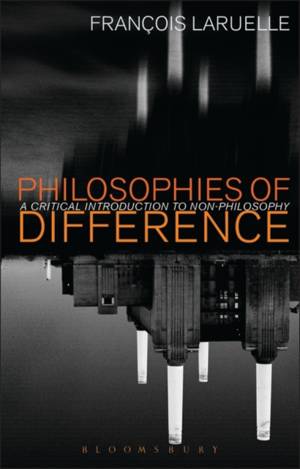
- Afhalen na 1 uur in een winkel met voorraad
- Gratis thuislevering in België vanaf € 30
- Ruim aanbod met 7 miljoen producten
- Afhalen na 1 uur in een winkel met voorraad
- Gratis thuislevering in België vanaf € 30
- Ruim aanbod met 7 miljoen producten
Zoeken
Philosophies of Difference
A Critical Introduction to Non-Philosophy
Francois Laruelle
Hardcover | Engels
€ 93,45
+ 186 punten
Uitvoering
Omschrijving
A crucial text in the development of François Laruelle's oeuvre and an excellent starting point for understanding his broader project, Philosophies of Difference offers a theoretical and critical analysis of the philosophers of difference after Hegel and Nietzsche. Laruelle then uses this analysis to introduce a new theoretical practice of non-philosophical thought.
Rather than presenting a narrative historical overview, Laruelle provides a series of rigorous critiques of the various interpretations of difference in Hegel, Nietzsche and Deleuze, Heidegger and Derrida. From Laruelle's innovative theoretical perspective, the forms of philosophical difference that emerge appear as variations upon a unique, highly abstract structure of philosophical decision, the self-posing and self-legitimating essence of philosophy itself. Reconceived in terms of philosophical decision, the seemingly radical concept of philosophical difference is shown to configure rather the identity of philosophy as such, which thus becomes manifest as a contingent and no longer absolute form of thinking. The way is thereby opened for initiating a new form of thought, anticipated here with the development of a key notion of non-philosophy, the Vision-in-One.
Rather than presenting a narrative historical overview, Laruelle provides a series of rigorous critiques of the various interpretations of difference in Hegel, Nietzsche and Deleuze, Heidegger and Derrida. From Laruelle's innovative theoretical perspective, the forms of philosophical difference that emerge appear as variations upon a unique, highly abstract structure of philosophical decision, the self-posing and self-legitimating essence of philosophy itself. Reconceived in terms of philosophical decision, the seemingly radical concept of philosophical difference is shown to configure rather the identity of philosophy as such, which thus becomes manifest as a contingent and no longer absolute form of thinking. The way is thereby opened for initiating a new form of thought, anticipated here with the development of a key notion of non-philosophy, the Vision-in-One.
Specificaties
Betrokkenen
- Auteur(s):
- Vertaler(s):
- Uitgeverij:
Inhoud
- Aantal bladzijden:
- 256
- Taal:
- Engels
Eigenschappen
- Productcode (EAN):
- 9780826436634
- Verschijningsdatum:
- 1/03/2011
- Uitvoering:
- Hardcover
- Formaat:
- Genaaid
- Afmetingen:
- 137 mm x 201 mm
- Gewicht:
- 385 g

Alleen bij Standaard Boekhandel
+ 186 punten op je klantenkaart van Standaard Boekhandel
Beoordelingen
We publiceren alleen reviews die voldoen aan de voorwaarden voor reviews. Bekijk onze voorwaarden voor reviews.








